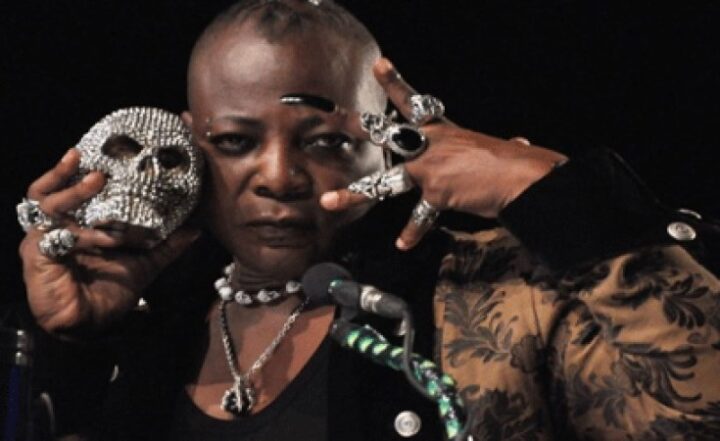Veteran entertainer Charles Oputa, popularly known as Charly Boy, has taken aim at a Lagos State local government for its decision to rename a public bus stop after the celebrated musician Olamide Adedeji. The outspoken activist criticized what he described as misplaced priorities, arguing that public infrastructure should not be leveraged for celebrity homage amid glaring civic needs.
Charly Boy expressed his dismay on social media and during interviews, insisting that the renaming was insensitive to the pressing challenges faced by everyday commuters in Nigeria’s largest city. He questioned why a bus stop—typically a functional body of urban infrastructure—was being used to honour an entertainer, instead of prioritizing infrastructure like hospitals, schools, streets, or public utilities that directly benefit the broader populace.

According to Charly Boy, the choice reflects a growing trend of celebrity worship overshadowing critical governance issues. “While Lagos struggles with power outages, traffic congestion, and unreliable transport infrastructure, we’re honouring entertainers at bus stops,” he said. He called on local authorities to redirect their focus and resources toward tangible public services that improve the lives of residents.
Supporters of the renaming—including constituents and fans of Olamide—defended the decision as a creative way to celebrate local talent and boost cultural pride. Olamide, a prominent figure in the Nigerian music scene, has achieved international acclaim and greatly influenced youth culture. For many, naming a public space after him represents recognition of how contemporary African artists shape cultural identity and inspire younger generations.
However, Charly Boy maintains that infrastructure naming should reflect the values of social impact and civic legacy. He suggested that naming rights be reserved for individuals whose contributions to public health, education, or social welfare are demonstrably transformative. “There are unsung heroes with real impact in communities—teachers, doctors, activists—yet we offer honours to celebrities with no link to public service,” he argued.
Urban planners and governance experts have weighed into the debate as well. Some argue that such renamings risk trivializing public assets and eroding the symbolic value of civic spaces. They emphasize the importance of preserving neutrality in areas of shared public use, pointing out that places of transport are meant to serve all citizens without bias. Critics warn that populist gestures might distract from deeper service delivery failures.
At the same time, others suggest the gesture could have marketing appeal, especially if bus routes near the renamed stop support visitor attractions linked to Olamide or entertainment districts. They argue that integrating urban branding with popular culture could boost foot traffic, stimulate micro‑commerce, and heighten civic pride in local identity. Some transport economists cite cities that name infrastructure after cultural icons to generate tourism interest and foster community cohesion.
Despite some support for naming public space after creative figures, Charly Boy insists that such honours should come with tangible benefits for the community. He challenged the local government to couple any renaming with investments—installing street lighting, improving security, paving roads, or enhancing transport shelters. Without these enhancements, he warned, the renaming risks being a vanity exercise devoid of practical value.
Local government officials behind the proposal defended their decision, stating that the renaming was done following public suggestions and democratic consultations. They emphasized that Olamide hails from the area and maintains strong ties with residents. The government also noted that a small upgrade initiative—painting the bus stop, adding signage and cleaning services—had been scheduled in conjunction with the renaming.
Charly Boy countered that cosmetic improvements are insufficient. He highlighted the broader context of Lagos’ urban transport needs: unreliable bus shelters, lack of seating, poor lighting, and chronic road degradation that affect millions of commuters daily. He asserted that political leaders should measure their impact by how they improve service delivery, curb infrastructure decay, and anchor public facilities in practical benefit rather than symbolic tribute.
The incident sparked wide online debate, with social media users divided between creative appreciation and civic pragmatism. Hashtags such as #BusStopNoHonor and #LetItBeABusStop trended briefly, with many agreeing with Charly Boy that the focus should remain on public service outcomes, not celebrity recognition. Others created memes celebrating Olamide, declaring the move a cool nod to modern Nigerian success.
Charly Boy’s challenge also reflects his longstanding advocacy for accountability in public administration. Over years, he has drawn attention to issues such as municipal neglect, environmental degradation, and social inequality. To him, the renaming episode typifies the disconnect between public office and citizens’ real needs, especially in a city grappling with density, gridlock, and resource constraints.
Calling on citizens to engage actively in local governance, Charly Boy urged communities to demand tangible improvements instead of entertaining symbolic gestures. He encouraged activists and residents to insist on infrastructure audits, participatory budgeting, and oversight to ensure public funds are directed toward genuine needs.
With Lagos continuing to grow rapidly, experts believe that symbolic initiatives—while harmless on their own—must not eclipse the urgent task of urban provisioning. The episode may serve as a cautionary tale, highlighting how local leaders’ decisions are scrutinized not just for intent but for context and consequence.
In sum, Charly Boy’s criticism underscores a deep tension between celebratory symbolism and developmental priorities. He invites Lagos officials to consider a more balanced approach—one where cultural recognition coexists with substantive service improvement. Otherwise, he warns, such gestures risk triviality and overlook the basic civic rights that should unite local governance with citizen welfare.
Support InfoStride News' Credible Journalism: Only credible journalism can guarantee a fair, accountable and transparent society, including democracy and government. It involves a lot of efforts and money. We need your support. Click here to Donate
